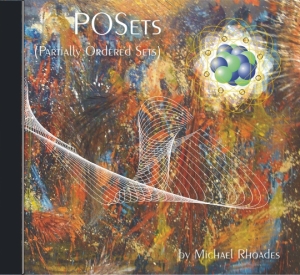 |
POSets (Partially Ordered Sets) was composed between March of 2008 and November of 2009. Recent research indicates that the human brain acts in an analog and chaotic manner when we are in the process of making a decision and then when the decision is reached it acts in a digital manner… yes or no… this or that… from chaos we transition to order. It is likely that computers of the future will function in this manner as well. The notion of partially ordered data sets fascinated the composer and inspired him to work with the data involved in this project from a similar perspective. In life we see many actions that begin as an orderly activity and turn to chaos or vise versa… a simple example is water. Molecules of ice are fairly ordered and slow moving when water is in a solid state. However, as it is heated the molecules begin moving faster and less orderly until, in a gaseous state, they move in an apparently chaotic manner. This is one of nearly limitless examples of the transition between chaos and order, which seems to pervade our lives.* Thus the impetus for POSets. On another level, POSets is meant to be a musical representation of a multi-dimensional listening experience taking place within non-linear architectures. Sound events in various dimensions of time and space undulate moving in and out of our awareness. Some exist briefly while others last much longer before folding back into a multi-dimensional stratum and out of our awareness. Each event takes place in its own unique spatial environment consisting of varying sizes and shapes and therefore challenges the listener with regard to exactly where any given event is taking place.. POSets would not be possible in its present form without a major contribution made by Mitch Gallagher, a highly accomplished writer, composer and guitarist. Mitch meticulously crafted 31 very unique samples from his guitar. Rhoades then whittled and edited these samples into 16 samples each less than 10 seconds in length and then made 144 samples that were variations of these samples. Organic Mechanisms was composed entirely from a set of these base samples. Two thirds of the base samples used to compose Cygnus Loop were chosen from them as well. Since for Rhoades composition begins with the creation of the base samples, Mitch is considered a collaborator in these two works. The additional base samples used in Cygnus Loop and all used in POSets were created by the composer. Rhoades creative process consists of the use of Csound, a programming language created for musical composition, Cmask a quasi-random number generator meant to generate Csound scores and an approach called score based sampling. In the end, the project was mixed using Sonar. Along the way, Mathematica, Excel, Metasynth and Sound Forge/CD Architect also played a part in its production. * It should be noted that ultimately true chaos does not exist. Chaos could instead be described as an action of which we are currently unable to comprehend the order. |
||
| Track 1 | POSets - 1st Movement
|
7:33 | |
| Track 2 | POSets - 2nd Movement
|
3:54 | |
| Track 3 | POSets - 3rd Movement
|
4:10 | |
| Track 4 | Organic Mechanisms - 1
|
3:11 | |
| Track 5 | Organic Mechanisms - 2
|
2:18 | |
| Track 6 | Organic Mechanisms - 3
|
1:31 | |
| Track 7 | Organic Mechanisms - 4
|
3:11 | |
| Track 8 | Organic Mechanisms - 5
|
1:23 | |
| Track 9 | Cygnus Loop - 1st Mvmt
|
5:33 |
|
| Track 10 | Cygnus Loop - 2nd Mvmt
|
6:14 |
|
| Track 11 | Cygnus Loop - 3rd Mvmt
|
3:23 |
|
| Track 12 | Cygnus Loop - 4th Mvmt
|
3:18 | |

Dedicated to the Advancement of Human Consciousness